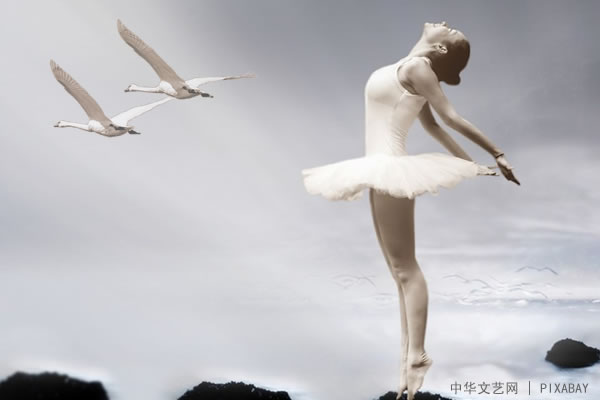徐敬亚:我尊称你为诗人
我尊称你为诗人 —— 序三泉诗集《天鹅之死》
作者:徐敬亚 世界上至少有两种诗。日常的、像蝴蝶一样在人间飞舞的诗与诗性语言,它们大概由过去常说的缪斯女神主管。我承认他们都算是诗人——这是站在人类学和社会学的立场。而另一类,超智的、天才的,对世界持有独特看法和语言魔力的诗,则只能由上帝亲手主管。我认为他们是能够影响人类的诗人——这是站在诗学和智慧、尊严的立场。 这些年,我对诗一直心怀以上两种广义、狭义的标准。对于一线的诗人们,我希望尽量拿出我的挑剔与刻薄。而对民间众多的诗歌写作者,我希望对他们越来越宽容。我的依据是:在当下中国,诗已成为社会的偏远部落。诗写得好、不太好、不好,已不再是重大问题。在强横的生存面前,诗已降低为一种“部落识别码”。它在一批人与另一批人之间划出了分隔红尘与天堂的边线……再严格一点说,是否守住好诗的严酷标准,其实是一个诗歌写作者撑下去的唯一理由。这正如我们可以无条件地承认一些生物属于女人,但整个人类对美女的标准仍然十分苛刻。 读三泉的诗,读了10来首时,我感到:他击中了我。 他不是那种刀枪翻飞,或者把金箍棒舞得团团转的武者。他像一个略含孤僻的默者,冷笑着偶尔刺过来几支匕首便转身而去。其实,这种高冷匕首的方式,早已成为当下的惯用路数。而同样的路数下,就看你的匕首尖不尖,深不深,你有没有真功夫。 我们读诗的兴趣、效果从哪里来,其实它只能起源于一种共同感。在千差万别的人类感觉中,毕竟还存在着某种互感的、公共性的念头与通道。 其实,诗歌圈内的阅读很可怕。我们这些一辈子和诗在一起的人,或者说同行的家伙们的阅读,与其说是专业的、老道的、挑剔的,不如说是麻木的、互轻的、职业病式的带有某种先天嫉妒味道的阅读。诗歌圈内总是不乏夸奖之辞。大致可分三类。一类是不知羞耻地夸赞。如排除无知,这类夸者应该改行或自杀。第二类是轻佻地夸奖,夸词如水面上漂浮,不敢真切用语,一看便知他藏在后面的脸微红。最后一类是阅读者的美学被击中,内感的界线被突破。这时候最奇妙的反应是这个阅读者的脑海中甚至涌出些微诗意,假设他还愿意说出来。 三泉对“时间”的感觉惊人。 他说:我刚写下“时间”,时间就被我用掉。这是魔鬼快速出现并被快速擦去的一瞬。 时间与空间,是我们感觉世界的基本框架。空间是骨骼,时间是灵魂。没有谁能描绘时间,它没有形状,没有始终。 三泉深一步说:我用掉自己,所以我证明,我是时间的边缘。这不仅是觉察,更似爱因斯坦式的辨断与宣告,几乎可以写出时间公式了。 如果没有专门的研究,他写不出高难度的归属感:时间,属于一场不存在的雨。他把时间的流逝形象化,然后又一笔虚化。 他说:我一直在过剩下的时光……父亲走后,母亲是剩下的。悲哀而残酷,他把不着边际的时间精致地切成带鱼段,阴阳两隔。 他说:时间不需加油……像一场电影中睡着的部分,被无情地忽略…… 他说:万物都在重复,只有死亡不会。 在中国当代诗人中,有谁这样精妙地品味过时间。在三泉最妙手偶得的几首诗中,他似乎成为时间体味大师。 无疑,第一辑《时间速写》是三泉最动人的部分。在后面几辑中我的感觉弱下来了。诗并不是用固定模具生产的。没有任何一位诗人永远能写出像麦茬一样同等高度的诗。 我似乎无法改变喜欢诗中金句的习惯。那些如美女一样的句子,是一首诗最深的划痕,是最能触动并释放读者高峰体验的搔点,如同匕首锋刃旁那一道放血的沟槽。对金句诗我的标准很简单:一是生命意识要重。二是感觉层面要轻。三是语言修辞要透明。 当然我也喜欢平缓、安静、纯然一色的感觉性的诗。那类诗的光并不强,也并不聚光灯似地只激射某几行。它是一种通篇发着光的亮度。虽然诗意温吞吞地平滑,但却可以有罗宋汤一样的浓度。那是另一类低调的高僧。它需要诗人通体透亮,具有独立于世的情感,甚至暗中的哲学与美学。这类诗人基本是悲悯忧伤的,走在月球的背面。 在读三泉的诗的时候,我像在一条起伏的路上踩点。我要寻找这个诗人的最高点!——即他看待世界的、唯他自己的那个基点的海拔。 我发现三泉对空间的感觉也有不凡。他说:我用一小时交换山的高度/又用三十分钟,把它归还。他把爬山者和山之间的关系写出了外交家的气度,用词讲究,内涵也舒展、高贵。他说:大海不停地放大悲伤/它把伤口缝上,又撕开……这个感觉倒是很多人所共有,但三泉的体验和修辞都更真切。别人也能刺,但他能刺出血。他说:每一滴水,都在咬紧牙关。其凶狠,超常。 在寻找他对本体的感知时,我找到了:当衰老来临/我的身体,竟有几分顺从。从文化意义上说,这是自我的分裂与不甘。从诗人写作的内感上讲,这样的自我反诘耗能很大,需要内心涌起相当大的浪涛。用词用语老道,“竟”字强大,“顺从”精准。他还说过:一支芦花替我活着。这是三泉哀伤的口吻。 有意思的是,我发现这本诗集中出现了10次引文。简单查了一下查不出。于是我索性在网上全部普查一遍,竟然踪影全无。我猜测那些句子出自他阅读范围内的某类书籍。而这些书籍又带有某种宗教的色彩。我也的确在这本诗集中嗅出了些许的另类气息:我有大片粮仓,依然低头去捡一棵稻穗……自然的主啊……请给我装上麋鹿的眼睛、绵羊的心。 26年前愤于名人序滥,我写过一篇文章《拒绝为人写序》。少壮悲愤自绝,老来何必执拗。于诗来说有感便发,无感摊手,管它什么名号。 回到开头的话题,什么是诗人?我认为:只能感动自己的,属于以诗为药的自救者。能感动别人的,才是普渡的诗者。 三泉,我愿意尊称你为诗人。 这是我写的序。
2022-3-10
I Respectfully Call You a Poet
By Xu Jingya
There are at least two kinds of poetry in the world. The daily poetry and poetic language that dance around this world like butterflies are presumably, as people used to say, presided over by the Muse. I admit that I regard them all as poets — from an anthropological and sociological standpoint. And the other group, those super-intelligent and gifted poetry with unique views and linguistic magic can only be in the charge of God himself. I believe they are poets who can influence human beings — this is from the standpoint of poetics, wisdom and dignity. Over the years, I have been thinking about poetry in both broad and narrow terms. As to the front-line poets, I hope to be as critical and caustic as possible. And when it comes to thenumerous folk poets, I hope to be more and more tolerant. My basis is that poetry has become a remote tribe of society in current China. What mattersa lot is no longer whether poetry is written well, not very well or not well at all. Poetry has been reduced to a “tribal identification code” in the face of tough survival, and itdraws a boundary line separating the world from heaven between one group and another... To put it more strictly, the adherence to the harsh standards of good poetry is actually the only reason for a poet to persist in his writing, just as,despite our unconditional admission that some creatures belong to women, the entire human race has very strict standards for beauty. After reading about 10 poems written by Sanquan, I felt:he struck me. He is less a martial artist who flips his sword or dances Monkey King's golden cudgel around than a silent man with slight solitude, sneering, occasionally stabbing a few daggers and turning away. In fact, this elegantly cold daggering has long become popular nowadays. It all depends, in the same way, on how sharp your dagger is, how deep it goes and how skilled you are. Our interest and effectiveness in reading poetry, as it is, originate from a common sense. There are, after all, some mutual inductance and common notions and channels in thousands of different human feelings. As a matter of fact, reading in the poetry world is quite awful.When reading, those of us who have livedwith poetry, or those fellow poets, are not so much professional, experienced and picky as insensitive, mutually contemptuous, occupational-disease-like and innately jealous. The praise that prevails in this circle fall roughly into three categories. The first is to compliment shamelessly. If ignorance is excluded, such flatterers should change their careers or commit suicide. The second is to praise frivolously. Words floating on water, he dares not make sincere comments. It’s obvious that his face hidden behind blushes slightly. The last is that the reader’s aesthetic sense is thrilled and the border of his inner feeling broken through. The most wonderful reaction at this time is that it even has a ring of poetry in his own mind, assuming that he chooses to say it at all. Sanquan has an amazing sense of “time”. He said: the moment I write down "time", I’ve used it up. This was the instant when the devil quickly appeared and was quickly wiped off. The basic framework where we feel the world is constituted by time and space which respectively make up bone and soul. No one can describe time, for it has neither shape, nor beginning or end. Sanquan said: I use up myself, so I prove that I am the edge of time. This showed not only perception, but Einstein’s judgment and declaration, almost writing a formula of time. Without special research, he couldn’t have written in a difficult sense of belonging: time belongs to a rain that does not exist. He visualized the passage of time and then virtualized it. He said: I've been spending what’s left in my life... After my father passed away, my mother makes what’s left. Sad and cruel, he delicately cut the endless time into fish segments, separating the living and the dead. He said: time needs no refueling... Like the sleeping part of watching a movie, which is ruthlessly ignored. He said: everything repeats, except death. There being noother contemporary Chinese poet who can deal with time in such an exquisite way, Sanquanseems to be a professional time taster in some of his most ingenious poems. Undoubtedly, I’m most impressed by the first series “Time Sketch”. And my feelings weakened in the next few series. Poetry is not produced in a fixed mold, and no poets can ever write poetry of the same height as the wheat stubble. I can’t seem to get out of the habit of favoring golden lines when reading poetry. Those beauty-like lines are the deepest scratches in a poem, which, just like the bleeding grooves next to the blade of a dagger, trigger and release the reader’s peak experience. My standard for golden verses is very simple: first, the life consciousness should be highlighted. Second, the feeling aspect should be lightened. Third, the linguistic rhetoric should be transparent. Of course, I also like gentle, quiet and pure poems that can wake up emotional echoes. Instead of spotlighting only a few lines, it shines with moderate and penetrating brightness. Tepid and smooth as its poetic quality is, it can have the same concentration as borscht. That’s another class of low-key eminent monk.The poet is required to be transparently bright, emotionally independent, and even reservedly knowledgeable about philosophy and aesthetics.Mostly compassionate and sentimental, such poets walk on the other side of the moon. When reading Sanquan’s poems, I feel like treading a rolling road. I want to seek his highest point — that is, the elevation from which he, himself alone, views the world. I found that Sanquan’s sense of space is also very impressive. He said: I exchange one hour for the height of the mountain / and 30 minutes for its return. With exquisite words and flexible and noble connotation, he described the relationship between climbers and mountains in a diplomat’s demeanor. He said: the sea kept magnifying its sadness / it sewed and tore its wounds... This feeling is shared by many people, but Sanquan's experience and rhetoric are more vivid and distinct. Others can stab while he can stab as well as bleeding. He said: every drop of water is gritting its teeth. Soextraordinarily fierce. In searching for his perception of noumenon, I found:when aging comes / my body is unexpectedly somewhat obedient, which, in a cultural sense, suggests self-fragmentation and unwillingness. In terms of the poet’s inner sense of writing, however, such self-questioning is rather energy-consuming and requires a considerable surge of waves in his heart. The diction is quite sophisticated, for example,“unexpectedly” is so overwhelming, and “obedient” extremely precise. He also said: a reed flower lives on behalf of me. This revealed the sadness typical of Sanquan. Interestingly, I came across 10 quotations in this collection, which I found from nowhere after a brief search. So I might as well make a thorough search on the Internet, only to discover no trace. I guess those lines came from some books he read that have a certain religious trait. I did smell something different in this collection:having a large area of granary, I still bow to pick up a stalk of rice... Lord of nature... please fit me with an elk’s eyes and a sheep’s heart. Angry at the flooding of celebrities’writing prefaces 26 years ago,I wrote an article titled I Refuse to Preface Others’ Works. Now I’m old enough to break my promise made out of sorrow and indignation when I was young. When it comes to poetry, where there is a feeling, there is a comment. Otherwise, no matter whose work it is, I have no comment to make. Back to the beginning, what makes a poet? I believe: he who can only move himself is a self-rescuer to take poetry as medicine. He who can move others is the poet to rescue all beings. Sanquan, I respectfully call you a poet. This is the preface I write. March 10, 2022 供稿:原作者 | 责任编辑:牧 野 |



 沪公网安备 31011802003845号
沪公网安备 31011802003845号